
Resources
The Glass Cage: Where Automation is Taking Us
Nicholas Carr (2015)
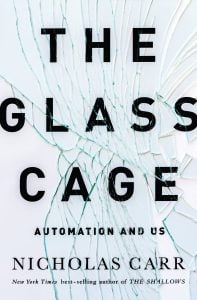 In The Glass Cage, Pulitzer Prize nominee and bestselling author Nicholas Carr shows how the most important decisions of our lives are now being made by machines and the radical effect this is having on our ability to learn and solve problems.
In The Glass Cage, Pulitzer Prize nominee and bestselling author Nicholas Carr shows how the most important decisions of our lives are now being made by machines and the radical effect this is having on our ability to learn and solve problems.
In May 2009 an Airbus A330 passenger jet equipped with the latest ‘glass cockpit’ controls plummeted 30,000 feet into the Atlantic. The reason for the crash: the autopilot had routinely switched itself off. In fact, automation is everywhere – from the thermostat in our homes and the GPS in our phones to the algorithms of High Frequency Trading and self-driving cars. We now use it to diagnose patients, educate children, evaluate criminal evidence and fight wars. But psychological studies show that we perform best when fully involved in a task, while the principle of automation – that humans are inefficient – is self-fulfilling. The glass cockpit is becoming a glass cage.
In this utterly engrossing exposé, bestselling writer Nicholas Carr reveals how automation is affecting our ability to solve problems, forge memories and acquire skills. Rather than rejecting technology, Carr argues that we must urgently rethink its role in our lives, using it to enhance rather than diminish the extraordinary abilities that make us human.
Digital Disconnect: How Capitalism is Turning the Internet Against Democracy
Robert McChesney (2014)
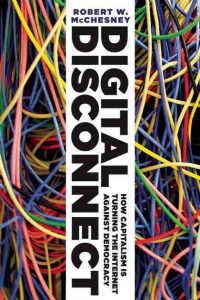 Celebrants and skeptics alike have produced valuable analyses of the Internet’s effect on us and our world, oscillating between utopian bliss and dystopian hell. But according to Robert W. McChesney, arguments on both sides fail to address the relationship between economic power and the Internet.
Celebrants and skeptics alike have produced valuable analyses of the Internet’s effect on us and our world, oscillating between utopian bliss and dystopian hell. But according to Robert W. McChesney, arguments on both sides fail to address the relationship between economic power and the Internet.
McChesney’s award-winning Rich Media, Poor Democracy skewered the assumption that a society drenched in commercial information is a democratic one. In Digital Disconnect, McChesney returns to this provocative thesis in light of the advances of the digital age. He argues that the sharp decline in the enforcement of antitrust violations, the increase in patents on digital technology and proprietary systems and massive indirect subsidies and other policies have made the internet a place of numbing commercialism. A handful of monopolies now dominate the political economy, from Google, which garners a 97 percent share of the mobile search market, to Microsoft, whose operating system is used by over 90 percent of the world’s computers.
Capitalism’s colonization of the Internet has spurred the collapse of credible journalism and made the internet an unparalleled apparatus for government and corporate surveillance and a disturbingly antidemocratic force.
In Digital Disconnect, Robert McChesney offers a groundbreaking critique of the Internet, urging us to reclaim the democratizing potential of the digital revolution while we still can.
Mind Change: How digital technologies are leaving their mark on our brains
Susan Greenfield (2014)
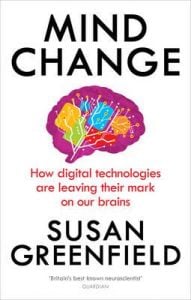 We live in a world unimaginable only decades ago: a domain of backlit screens, instant information, and vibrant experiences that can outcompete dreary reality. Our brave new technologies offer incredible opportunities for work and play. But at what price?
We live in a world unimaginable only decades ago: a domain of backlit screens, instant information, and vibrant experiences that can outcompete dreary reality. Our brave new technologies offer incredible opportunities for work and play. But at what price?
Now renowned neuroscientist Susan Greenfield—known in the United Kingdom for challenging entrenched conventional views—brings together a range of scientific studies, news events, and cultural criticism to create an incisive snapshot of “the global now.” Disputing the assumption that our technologies are harmless tools, Greenfield explores whether incessant exposure to social media sites, search engines, and videogames is capable of rewiring our brains, and whether the minds of people born before and after the advent of the Internet differ.
Stressing the impact on Digital Natives—those who’ve never known a world without the Internet—Greenfield exposes how neuronal networking may be affected by unprecedented bombardments of audiovisual stimuli, how gaming can shape a chemical landscape in the brain similar to that in gambling addicts, how surfing the Net risks placing a premium on information rather than on deep knowledge and understanding, and how excessive use of social networking sites limits the maturation of empathy and identity.
But Mind Change also delves into the potential benefits of our digital lifestyle. Sifting through the cocktail of not only threat but opportunity these technologies afford, Greenfield explores how gaming enhances vision and motor control, how touch tablets aid students with developmental disabilities, and how political “clicktivism” foments positive change.
In a world where adults spend ten hours a day online, and where tablets are the common means by which children learn and play, Mind Change reveals as never before the complex physiological, social, and cultural ramifications of living in the digital age. A book that will be to the Internet what An Inconvenient Truth was to global warming, Mind Change is provocative, alarming, and a call to action to ensure a future in which technology fosters—not frustrates—deep thinking, creativity, and true fulfillment.
“Live Version of Google Earth” used for mass surveillance by police
LA County Sheriff’s Department in Compton, California deploy aerial real-time surveillance, unbeknownst to residents.
The technology is called “Wide Area Surveillance.”
The Big Disconnect — Why the Internet hasn’t transformed politics (yet)
Micah L. Sifry (2014)
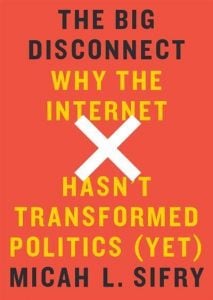 “Now that communication can be as quick as thought, why hasn’t our ability to organize politically—to establish gains and beyond that, to maintain them—kept pace? The web has given us both capacity and speed: but progressive change seems to be something perpetually in the air, rarely manifesting, even more rarely staying with us.
“Now that communication can be as quick as thought, why hasn’t our ability to organize politically—to establish gains and beyond that, to maintain them—kept pace? The web has given us both capacity and speed: but progressive change seems to be something perpetually in the air, rarely manifesting, even more rarely staying with us.
Micah L. Sifry, a longtime analyst of democracy and its role on the net, examines what he calls “The Big Disconnect.” In his usual pithy, to-the-point style, he explores why data-driven politics and our digital overlords have failed or misled us, and how they can be made to serve us instead, in a real balance between citizens and state, independent of corporations.
The web and social media have enabled an explosive increase in participation in the public arena—but not much else has changed. For the next step beyond connectivity, writes Sifry, “we need a real digital public square, not one hosted by Facebook, shaped by Google and snooped on by the National Security Agency. If we don’t build one, then any notion of democracy as ‘rule by the people’ will no longer be meaningful. We will be a nation of Big Data, by Big Email, for the powers that be.”
The Spying Lamp “Conversnitch”
Who Pays the Price? The Human Cost of Electronics
“This short video reveals the hazards of the electronics industry in China profiling workers poisoned by chemicals and their struggle for compensation.
Thousands of young people in China enter export factories to make the West’s favorite electronic gadgets, only to find they have contracted occupational diseases or worse, leukemia, by the age of 25.”
To Save Everything, Click Here
Evgeny Morozov (2013)
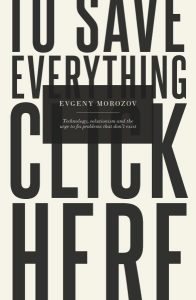 In the very near future, technological systems will allow us to make large-scale and sophisticated interventions into many more areas of public life: politics, culture, public debate, even our definitions of morality and human values. But how will these be affected once we delegate much of the responsibility for them to technology? The temptation of the digital age is to fix everything—from crime to corruption to pollution to obesity—by digitally quantifying, tracking, or gamifiying behavior. But when we change the motivations for our moral, ethical, and civic behavior, we may also change the very nature of that behavior itself. Technology, Evgeny Morozov proposes, can be a force for improvement—but only if we abandon the idea that it is necessarily revolutionary and instead genuinely interrogate what we are doing with it and what it is doing to us.
In the very near future, technological systems will allow us to make large-scale and sophisticated interventions into many more areas of public life: politics, culture, public debate, even our definitions of morality and human values. But how will these be affected once we delegate much of the responsibility for them to technology? The temptation of the digital age is to fix everything—from crime to corruption to pollution to obesity—by digitally quantifying, tracking, or gamifiying behavior. But when we change the motivations for our moral, ethical, and civic behavior, we may also change the very nature of that behavior itself. Technology, Evgeny Morozov proposes, can be a force for improvement—but only if we abandon the idea that it is necessarily revolutionary and instead genuinely interrogate what we are doing with it and what it is doing to us.
From urging us to abandon monolithic ideas of “the Internet” to showing how to design more humane and democratic technological solutions, To Save Everything, Click Here is a dazzling tour of our technological future, and a searching investigation into the digital version of an enduring struggle: between man and his machines.
Addiction by Design
Natasha Dow Schull, Cultural Anthropologist from MIT talking on addiction and slot machines.
Present Shock: When Everything Happens Now
Douglas Rushkoff (2013)
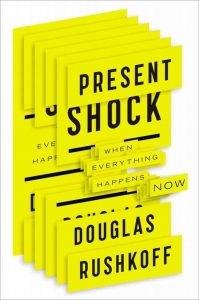 This is the moment we’ve been waiting for, explains award-winning media theorist Douglas Rushkoff, but we don’t seem to have any time in which to live it. Instead we remain poised and frozen, overwhelmed by an always-on, live-streamed reality that our human bodies and minds can never truly inhabit. And our failure to do so has had wide-ranging effects on every aspect of our lives.
This is the moment we’ve been waiting for, explains award-winning media theorist Douglas Rushkoff, but we don’t seem to have any time in which to live it. Instead we remain poised and frozen, overwhelmed by an always-on, live-streamed reality that our human bodies and minds can never truly inhabit. And our failure to do so has had wide-ranging effects on every aspect of our lives.
People spent the twentieth century obsessed with the future. We created technologies that would help connect us faster, gather news, map the planet, compile knowledge, and connect with anyone, at anytime. We strove for an instantaneous network where time and space could be compressed.
Well, the future’s arrived. We live in a continuous now enabled by Twitter, email, and a so-called real-time technological shift. Yet this now is an elusive goal that we can never quite reach. And the dissonance between our digital selves and our analog bodies has thrown us into a new state of anxiety: present shock.
Rushkoff weaves together seemingly disparate events and trends into a rich, nuanced portrait of how life in the eternal present has affected our biology, behavior, politics, and culture. He explains how the rise of zombie apocalypse fiction signals our intense desire for an ending; how the Tea Party and Occupy Wall Street form two sides of the same post-narrative coin; how corporate investing in the future has been replaced by futile efforts to game the stock market in real time; why social networks make people anxious and email can feel like an assault. He examines how the tragedy of 9/11 disconnected an entire generation from a sense of history, and delves into why conspiracy theories actually comfort us.
As both individuals and communities, we have a choice. We can struggle through the onslaught of information and play an eternal game of catch-up. Or we can choose to live in the present: favor eye contact over texting; quality over speed; and human quirks over digital perfection. Rushkoff offers hope for anyone seeking to transcend the false now.
Absorbing and thought-provoking, Present Shock is a wide-ranging, deeply thought meditation on what it means to be human in real-time.
The Filter Bubble: What the Internet is Hiding from You
Eli Pariser (2012)
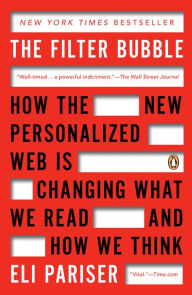 Imagine a world where all the news you see is defined by your salary, where you live, and who your friends are. Imagine a world where you never discover new ideas. And where you can’t have secrets.
Imagine a world where all the news you see is defined by your salary, where you live, and who your friends are. Imagine a world where you never discover new ideas. And where you can’t have secrets.
Welcome to 2011.
Google and Facebook are already feeding you what they think you want to see. Advertisers are following your every click. Your computer monitor is becoming a one-way mirror, reflecting your interests and reinforcing your prejudices.
The internet is no longer a free, independent space. It is commercially controlled and ever more personalised. The Filter Bubble reveals how this hidden web is starting to control our lives – and shows what we can do about it.
Alone Together
Sherry Turkle (2011)
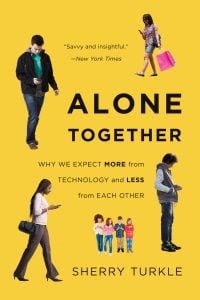 Technology has become the architect of our intimacies. Online, we fall prey to the illusion of companionship, gathering thousands of Twitter and Facebook friends, and confusing tweets and wall posts with authentic communication. But this relentless connection leads to a deep solitude. MIT professor Sherry Turkle argues that as technology ramps up, our emotional lives ramp down. Based on hundreds of interviews and with a new introduction taking us to the present day, Alone Together describes changing, unsettling relationships between friends, lovers, and families.
Technology has become the architect of our intimacies. Online, we fall prey to the illusion of companionship, gathering thousands of Twitter and Facebook friends, and confusing tweets and wall posts with authentic communication. But this relentless connection leads to a deep solitude. MIT professor Sherry Turkle argues that as technology ramps up, our emotional lives ramp down. Based on hundreds of interviews and with a new introduction taking us to the present day, Alone Together describes changing, unsettling relationships between friends, lovers, and families.
The Net Delusion
Evgeny Morozov (2011)
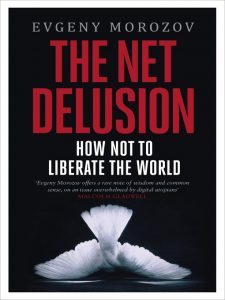 “The revolution will be Twittered!” declared journalist Andrew Sullivan after protests erupted in Iran. But as journalist and social commentator Evgeny Morozov argues in The Net Delusion, the Internet is a tool that both revolutionaries and authoritarian governments can use. For all of the talk in the West about the power of the Internet to democratise societies, regimes in Iran and China are as stable and repressive as ever. Social media sites have been used there to entrench dictators and threaten dissidents, making it harder—not easier—to promote democracy.
“The revolution will be Twittered!” declared journalist Andrew Sullivan after protests erupted in Iran. But as journalist and social commentator Evgeny Morozov argues in The Net Delusion, the Internet is a tool that both revolutionaries and authoritarian governments can use. For all of the talk in the West about the power of the Internet to democratise societies, regimes in Iran and China are as stable and repressive as ever. Social media sites have been used there to entrench dictators and threaten dissidents, making it harder—not easier—to promote democracy.
Marshalling a compelling set of case studies, The Net Delusion shows why the cyber-utopian stance that the Internet is inherently liberating is wrong, and how ambitious and seemingly noble initiatives like the promotion of “Internet freedom” are misguided and, on occasion, harmful.